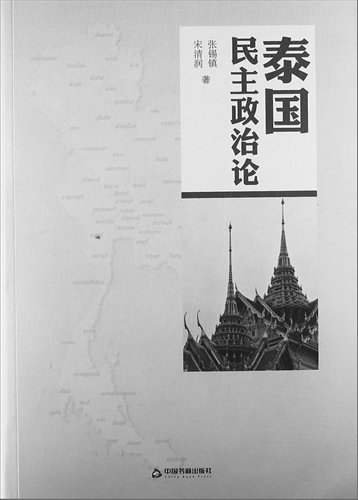HOME >> OP-ED
Thailand in need of democratic systems that suit its own reality
Source:Global Times Published: 2013-10-31 20:38:01

Zhang Xizhen & Song Qingrun, Thai Democratic Politics, China Book Press, October 2013
Thailand, the only country not to be colonized in Southeast Asia and the first constitutional democracy established in the region, is still probing in the dark when it comes to democratic politics. Since the year of 1932 when it was introduced, the democratic system has been unstable and turbulent.
Military coups have been common. Freedom of assembly and the right to demonstrate are not tools for maintaining freedom or overthrowing authoritarian rule in this country, but instead have long played a role of deepening confrontations and class antagonism.
Why hasn't a stable popular government been established in this democratic country? Why hasn't the democratic system naturally led to harmonious and stable political order as theorists expect? Similar questions have nagged scholars for years.
Thai Democratic Politics coauthored by Zhang Xizhen, professor at School of International Studies at Peking University, and Song Qingrun, research fellow of the Institute of South and Southeast Asian and Oceanian Studies at China Institutes of Contemporary International Relations, published by China Book Press in October, attempts to answer these questions.
The highlight of the book is that it offers a fresh analysis from a non-Western perspective.
Many academics have studied this problem by looking into democratic trajectories in the West, without proposing possible solutions. Unlike this set pattern, the book Thai Democratic Politics starts with the self-development of democracy in Thailand.
The authors first conduct a systemic study on the origin of Thai democratic ideas and famous Thai thinkers in this field, and analyze the development of democracy in Thailand against this historical background.
Their study penetrates various democratic mechanisms, including the constitution, parliament, government, political parties, the royal family and military forces, in order to explore their modes of operation.
Through this, they analyze the obstacles and constraints that stand in the way of Thai democratic transition due to the existing power structure, social fragmentation, political corruption, political culture and the legal system.
Based on the above-mentioned analysis, the authors propose some feasible paths of the future development of Thai democracy.
They believe the problem of Thai chaos does not lies with democracy, but Thai democracy getting out of step with the level of the country's economic and social conditions.
What Thailand needs currently, according to the book, is not Western-style democracy but perhaps "authoritarian democracy."
Traditional democratic approaches will inevitably lead to a eurocentric focus, which limits the studies on democratic systems in developing countries. This book takes an endogenous and non-Western perspective, and does not see democracy as a panacea.
Instead of Thailand not being enough like the West, the book unsurprisingly sees its problems as not being enough like China.
Democracy itself does not necessarily lead to a rosy picture of development. Therefore, as the authors claim in the book, whether a country's political modernization is successful or not actually does not depend on how much freedom and how many rights the people suddenly gain, but whether this mode of modernization can help promote the sustainable development of the country and guarantee continuous fairness and justice within the society.
Posted in: Fresh off the Shelf, Viewpoint